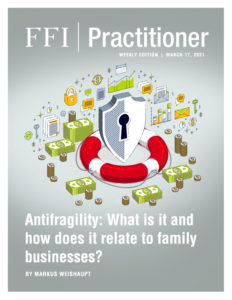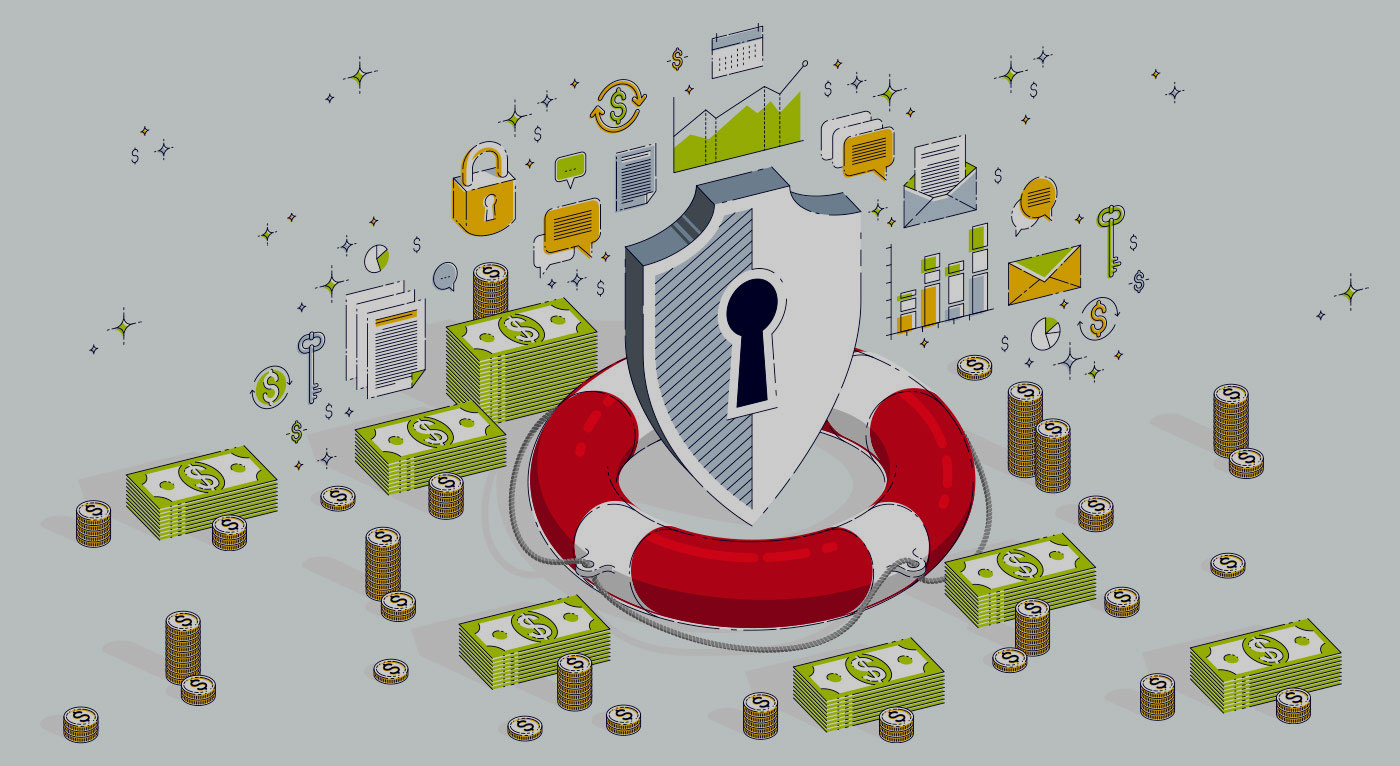
View this edition in our enhanced digital edition format with supporting visual insight and information.
Thanks to this week’s contributor, Markus Weishaupt, for his article exploring the concept of antifragility and how it may apply to family business clients.
Beyond the world of stock markets, there is the huge economic subsystem of family businesses in which the following question arises: Is it possible that family businesses not only survive crises, but are actually strengthened by them?
The concept of antifragility
In his book Antifragile: Things That Gain from Disorder,1 Nassim Nicholas Taleb establishes the concept of “antifragility.” He distinguishes among fragile, robust, and antifragile. The fragile is destroyed by great stress, and thus disappears. The robust withstands stress and may be weakened but not destroyed by it. The antifragile, on the other hand, is strengthened by stress.
According to Taleb, the prerequisite for antifragility is complexity. The antifragile benefits from shocks, random events and crises and becomes even better through them. Conversely, anything that cannot withstand these great stresses disappears because it is fragile.
Systemic antifragility of family businesses
It is precisely during and after deep crises that we experience how strongly the economic subsystem of family businesses benefits from them. There is no doubt that unforeseeable, drastic events, such as the financial crisis of 2008-2009 and the Covid-19 pandemic of 2020, confront many family businesses with existential threats. The more often such negative experiences are lived through, the more the stability of many businesses might suffer. Being robust and financially sound can help a business weather a crisis, but that robustness is not enough to survive over the long term in a world that is inevitably lurching from crisis to crisis. Real strength emerges from overcoming unpredictable, exogenous shocks such as wars, technological breakthroughs, financial crises, and catastrophes, including pandemics. Strength emerges from overcoming sudden shocks that are unforeseen, but are at the same time predictable.
Fragility is always on the lookout
Entrepreneurial negligence, in particular, can turn actually predictable events into unforeseen ones. Entrepreneurs who rest on their past success and get used to routine procedures often become lethargic. They forget to develop the company further and slide into dangerous fragility. On the other hand, successful entrepreneurs lead the company through disruptive processes that move the organization from one stable system to the next, anticipating market contexts and meeting market expectations. Understanding a change mission is an important component in training for antifragility.
Fragile businesses are those that do not develop options. Secure jobs, automated annual salary increases, and non-terminable employment can create a dangerous fragility bubble. When the next crisis hits, the uncompromising force of abrupt social, environmental, or economic shock waves frequently catches up with this pseudo-reality. Lack of vigilance and resistance to change are alarm signals for those who are comfortable in their fragility.
What characterizes antifragile businesses?
Family businesses that persist for decades and centuries seem to be “survivor artists,” given that relatively few family businesses enter the fifth generation. Conversely, this means that most family businesses bow out in the first four generations. Yet these businesses are not antifragile by definition.
According to Taleb, people and organizations need time and free space if the companies are to become antifragile. They must be given the opportunity to work creatively, to try out new things, to make mistakes, and to deal with new, different topics. Thus, interdisciplinary knowledge is created throughout the company, increasing the complexity of control, but making sustainable success more likely.
Additionally, companies need to create choices and think of options when approaching a problem, keeping flexible mindsets, knowing that the option ultimately chosen will need a coherent implementation plan.
Focus is another strength of the antifragile company. Pursuing options may take time but focusing on the outcome is captivating. Antifragile companies are as consistent in saying “no” as they are in implementing the things they affirm.
Antifragile family businesses may not be complicated, but they are consistently complex, requiring highly complex skills to manage the systems of “family” and “business.” Antifragility champions master this task by reducing the complexity to a level that keeps employees and the entire company attentive. They answer recurring, essential corporate management questions unequivocally: What are the priorities? Which activities have the highest impact? Which activities should be eliminated? What do we make, what do we buy? Who is our customer and who is not? What happens if we do not do this or that? Unambiguous answers to these persistent questions sharpen focus and keep the organization alert.
Antifragile businesses typically document errors, their background, manifestation, effect, causes, and probability. They discuss the “error case” down to the last detail, so that it sinks into the company memory, allowing similar, future errors to be recognized in advance.
Antifragile family business are run by entrepreneurs who see their vocation as mastering complex challenges—not run by fragile entrepreneurs and entrepreneurial families. These are entrepreneurs who want to assert themselves every day, who know that the greatest opportunities and risks lie in the smallest probabilities They know that the next crisis is just around the corner and that it will be used to strengthen their family business.
What are signs of antifragility in a family business?
- Intuitive recognition of opportunities in situations of crisis.
- Existing robustness and stability to make necessary investments in macro-economic downturns.
- Mental flexibility and the will to emerge strengthened from the crisis.
- A corporate culture of commitment and loyalty.
- Strategic, organizational and cultural preparation to manage successfully and be ready for emergencies.
- The knowledge that the greatest risks and opportunities lie in the smallest probabilities.
How to assist family business clients in becoming antifragile: Some conversation starters
- Structure your engagement with the client to include periodic phases that may be managed with reduced resources.
- Help guide the family owners to build financial strength: Strengthen equity, avoid debt, always have sufficient cash.
- Encourage your client to constantly confront the company with challenges: Search for new products, services, processes, systems.
- Recommend the company remains focused on effectiveness and productivity.
- Ensure the business demands uncompromising customer satisfaction in all areas.
- Introduce exercises to expose the company to hypothetical crisis scenarios, so that the organization has to train agility and adaptability.
Reference
1Nassim Nicholas Taleb (2012). Antifragile: Things That Gain from Disorder. New York: Random House.
About the Contributor

Prof. (FH) Dott. Markus Weishaupt is managing partner of Weissman International, where he advises and accompanies family businesses in their strategic, organizational and cultural challenges in succession and corporate and family governance. He is also a professor at the FH Kufstein-University of Applied Sciences (Austria) and the creator of an online analysis tool for family businesses: Family Business Model Tool. He can be reached at [email protected].

View this edition in our enhanced digital edition format with supporting visual insight and information.





